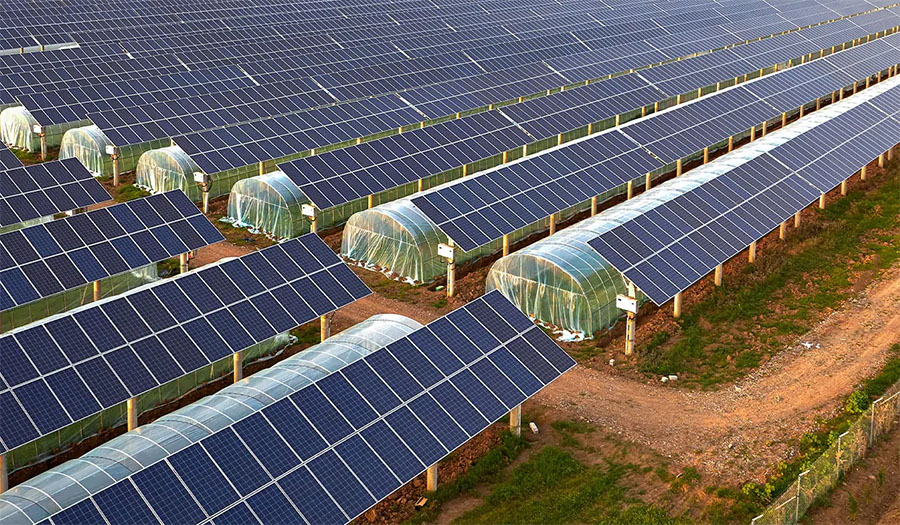Maximizing Crop Yield and Energy Savings with GiPV Modules in Modern Greenhouses
In the face of rising energy costs and the global push for sustainability, greenhouse farming is undergoing a transformation. One of the most innovative solutions in this evolution is Greenhouse Integrated Photovoltaic (GiPV) Modules. These advanced solar technologies not only generate renewable energy but also create an optimized environment for plant growth. Leading the charge in this field is DEG SOLAR, a trusted provider of high-efficiency GiPV modules designed to help greenhouse operators maximize both crop yield and energy savings.

What Are GiPV Modules?
Greenhouse Integrated Photovoltaic (GiPV) Modules are specially designed semi-transparent or opaque solar panels that are integrated into greenhouse structures. Unlike traditional solar panels, GiPV modules allow selective light transmission, ensuring plants receive the necessary spectrum for photosynthesis while harnessing solar energy to power greenhouse operations.
How GiPV Modules Enhance Crop Yield
One of the main concerns of greenhouse farmers is whether solar panels will block essential sunlight for crops. However, advanced DEG SOLAR GiPV modules are engineered to optimize light utilization, ensuring plants receive the optimal balance of sunlight while reducing excessive heat exposure. Here’s how they improve crop productivity:
-
Optimized Light Transmission:
DEG SOLAR’s GiPV modules are designed with customizable transparency levels, allowing the ideal amount of sunlight to pass through. This promotes photosynthesis efficiency, ensuring healthy plant growth. -
Temperature Control for Better Growth Conditions:
Traditional greenhouses often suffer from excessive heat buildup, which can negatively impact plant development. GiPV modules regulate the internal temperature by reducing direct solar radiation, maintaining a stable climate for crops such as tomatoes, leafy greens, and flowers. -
Reduced Water Evaporation:
With GiPV modules providing partial shading, water evaporation rates decrease, leading to significant water savings. This is particularly beneficial in arid and semi-arid climates where water conservation is crucial for sustainable farming.
Energy Savings with GiPV Modules
The integration of GiPV modules in greenhouses is not just about improving plant growth—it’s also about energy efficiency. Here’s how DEG SOLAR’s GiPV solutions help greenhouse owners cut costs and reduce their carbon footprint:
-
On-Site Renewable Energy Generation:
GiPV modules convert solar energy into electricity, reducing reliance on fossil fuels and lowering greenhouse energy expenses. The generated power can be used for lighting, irrigation systems, ventilation, and climate control, making greenhouses more self-sufficient. -
Grid Independence & Energy Storage Compatibility:
By installing GiPV modules with battery storage systems, greenhouse operators can store excess electricity for nighttime use or during cloudy days, ensuring a continuous energy supply. -
Government Incentives & Subsidies:
Many regions offer renewable energy subsidies and tax benefits for adopting solar technology in agriculture. Greenhouse owners who invest in DEG SOLAR GiPV modules can take advantage of these financial incentives while promoting eco-friendly farming.
Why Choose DEG SOLAR GiPV Modules?
DEG SOLAR is a pioneer in solar energy solutions and has specifically designed its GiPV modules for greenhouse applications. Here’s why they stand out:
-
High-Efficiency Solar Cells – Maximizing power output while ensuring proper light diffusion for crops.
-
Durability & Weather Resistance – Engineered to withstand harsh climate conditions, ensuring long-term reliability.
-
Customizable Transparency Levels – Tailored to different plant species’ light requirements.
-
Easy Integration – Designed for seamless installation into existing and new greenhouse structures.
Conclusion
Greenhouse Integrated Photovoltaic (GiPV) Modules represent the future of sustainable agriculture, offering a dual advantage—maximizing crop yield while significantly reducing energy costs. With leading solutions from DEG SOLAR, greenhouse operators can achieve higher productivity, enhanced sustainability, and greater financial savings.
By investing in GiPV technology, modern greenhouses can become energy-efficient powerhouses, contributing to a greener and more profitable agricultural sector. Whether you’re a commercial grower or a sustainable farming enthusiast, DEG SOLAR GiPV modules provide the perfect synergy between renewable energy and high-yield agriculture.
Would you like to explore how DEG SOLAR’s GiPV solutions can benefit your greenhouse? Contact us today to learn more!



